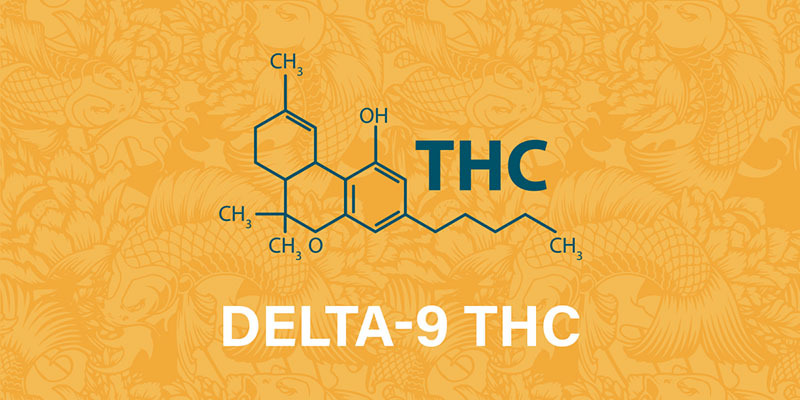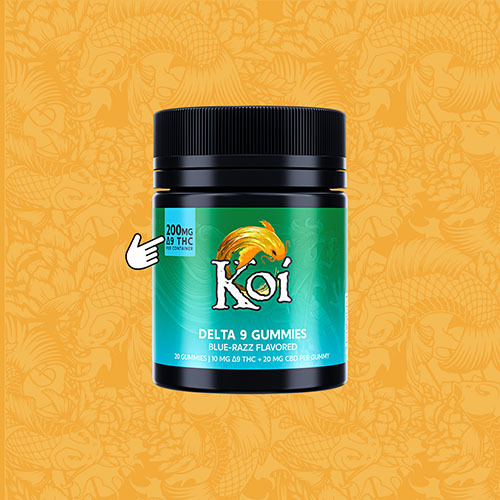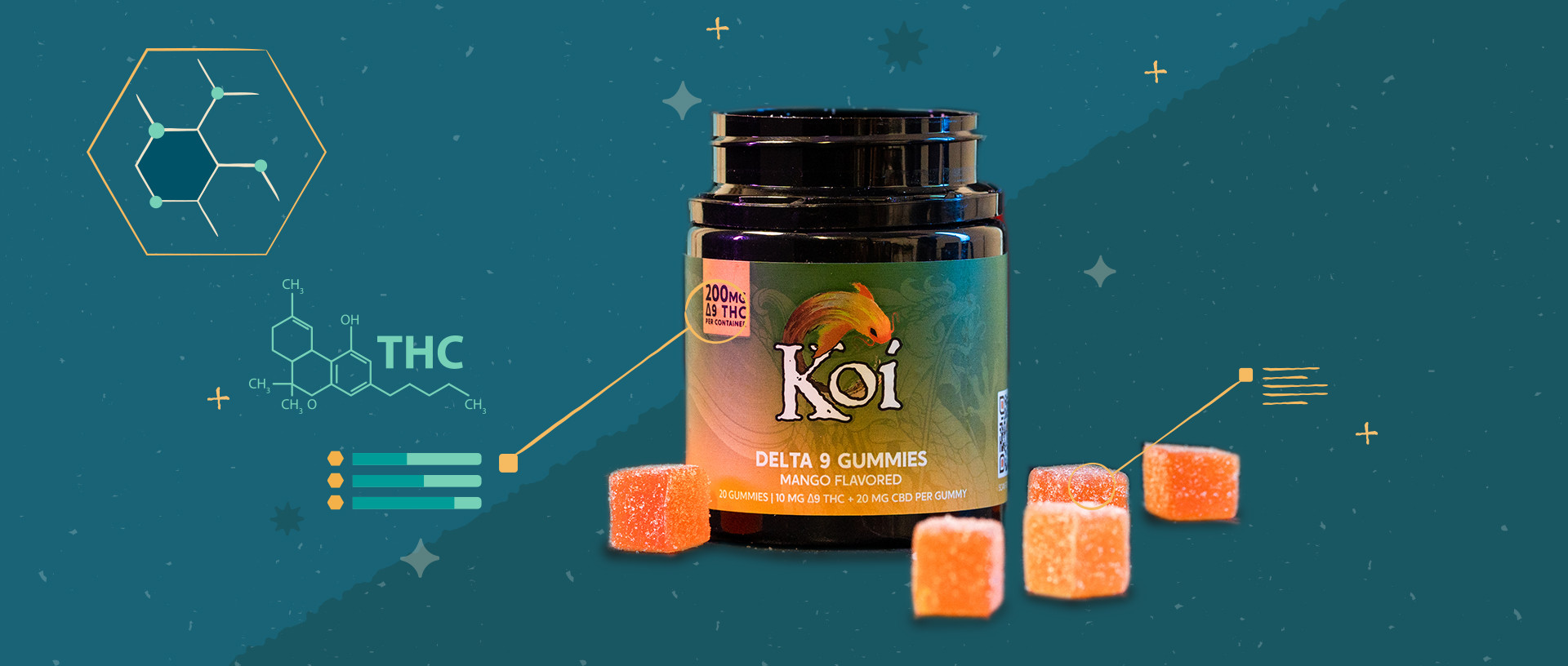Delta 9 and THC are one and the same. How much THC is in a particular delta-9 product varies. Here's what to know about THC, delta 9, and figuring out a product's potency.
Key takeaways:
- Delta-9 is the most common and abundant type of THC.
- The terms "THC" and "delta 9" are used interchangeably. THC is regularly used to reference delta 9, the most popular and widely used type of THC.
- The amount of THC in a delta 9 product varies depending on its potency.
Delta 9 THC has remained the most popular type of THC in the market. It's renowned for its potent uplifting properties. It is highly rated for its benefits and is usually used as a yardstick to establish the potency of other types of THC, like delta 8 and delta 10.
Without a doubt, delta 9 has cemented its place in the THC books and in the hearts of anyone who enjoys the elevating benefits that hemp can deliver. But just how much THC does it have? It's a confusing question considering delta 9 is THC but a valid one nonetheless.
What is THC?
Let's start by distinguishing THC and delta 9 and establishing whether there is a difference. THC is short for tetrahydrocannabinol, one of the primary components in cannabis plants. The compound gives the plant its uplifting properties that you've likely enjoyed while relaxing. THC is also thought to have numerous natural health and wellness benefits.
Although THC is just one of the hundreds of substances in the plant and over 100 cannabinoids, it has the most notoriety and is the most recognized, for a good reason.
How THC Works
The greatest puzzle with THC has always been how it simultaneously imparts numerous benefits to the body. Scientific studies have unearthed possible ways THC interacts with the body to produce these benefits.
Although most of these studies are ongoing, THC works through a system already established inside all mammals called the Endocannabinoid System (ECS). Its role is maintaining homeostasis and processing cannabinoids; both cannabinoids produced in the body and those obtained through plants.
Once in the body, THC attaches to the cannabinoid receptors found throughout the brain and nervous system. THC can also interact with other receptors in the body, like the serotonin receptors, which is how experts believe it influences mood and other factors like sleep.
Although the elevating effects of THC are short-lived and only last for a few hours, THC remains detectable in the body for much longer. That's because it is stored in body fat and organs for three to four weeks. However, you may not experience any effects during this extended period unless you take more THC.

What is Delta 9?
When people reference THC, they're nearly always referring to delta 9. Delta 9 is the most abundant and widely used form of THC that occurs naturally in cannabis. As described above, it's responsible for the plant's uplifting properties.
Regardless of the extraction process or the strain it is harvested from, delta 9 is delta 9, and its chemical structure remains the same.
However, the term delta 9 is most often used to describe delta-9 from hemp. The use of the term has surged in popularity following the legalization of hemp and its derivatives with the passage of the 2018 Farm Bill. This federal law legalizes the use of hemp-derived delta 9 products as long as their concentration doesn't surpass 0.3% by dry weight in the product.
Uses of Delta 9 THC
Delta 9 THC is not just famous for its uplifting effects. Over the past several years, cannabinoids have had a resurgence in the wellness and health field because of the potential benefits they offer. As a result, the uses of delta 9 have expanded to include the following:
Relaxation and mood support
The most common reason people use delta 9 or THC is to relieve stress and elevate mood. Most studies looking into these benefits have found that smaller servings of THC are best for achieving a state of blissed-out relaxation. In comparison, higher servings can worsen stressed feelings.
Body relief support
Delta 9's positive influence on the body's endocannabinoid system is thought to help you feel better overall. People often use delta 9 when feeling physically uncomfortable, tight, or sore. Aches and soreness are common issues for many people, and delta 9 can offer some natural relief after strenuous workouts or physically intense days.
Appetite support
Some use delta 9 to help promote healthier eating habits. This form of THC has been associated with enhancing the pleasure of eating. In addition, some evidence suggests that it heightens your sense of smell, improving food's taste.
Sleep support
Delta 9 also has some benefits that might help you sleep better. Delta 9 delivers calming and relaxing effects that can help quiet your mind and relax at the end of the day, preparing you for better sleep.
The fact that delta 9 also aids in body relief might also help you sleep better at night if you're feeling physical discomfort that might interfere with your sleep. For example, you may benefit from using delta 9 edibles an hour or so before bed to prepare your body for a restful night.
Delta 9 THC Vs. THC
Delta 9 THC and THC are terms used interchangeably within hemp circles. Technically, using the two words interchangeably is incorrect.
THC is short for Tetrahydrocannabinol, a compound in all cannabis plants known for its uplifting effects.
THC is a cannabinoid; there are over 100 cannabinoids in hemp in various forms. Delta 9 is the most prominent of the THC forms but also one of the several THC isomers in the plant.
THC is a cannabinoid; there are over 100 cannabinoids in hemp in various forms. Delta 9 is the most prominent of the THC forms but also one of the several THC isomers in the plant.
Other THC isomers have a similar chemical formula except for a slight variation in the atomic arrangement. Different common variations of THC include Delta 8 and Delta 10.
THC is a type of chemical compound that is present in different isomers. Delta 9 is by far the most abundant and most famous of them. So while you're correct to refer to delta 9 as THC, technically, all the other isomers are also THC.
How Much THC is in Delta 9?
With the knowledge that Delta 9 is an isomer of THC, it's easier to determine how much THC is in delta 9.
If the delta 9 THC is pure, it technically contains 100 percent THC. Being an isomer of THC, delta 9 contains no other compounds. However, for delta 9 and its products to be legal under the Farm Bill, delta 9 THC products must have no more than 0.3 percent THC by dry weight.
THC potency can vary by product. To determine how much THC is in your delta 9 products, review the packaging to see how many milligrams of delta-9 THC they contain.

Hemp-derived Delta 9 Vs. Marijuana Derived Delta 9
A few years ago, virtually every legal delta 9 product was marijuana-derived. When the 2018 Farm Bill was enacted, it changed everything on its head, and now, most of the products you find online, including delta 9 products, are hemp-derived. What's the difference, you ask?
There is a difference between hemp-derived and marijuana-derived delta 9. But this difference is not quality or composition based. Instead, it's legal.
Marijuana is a controlled substance at the federal level, which makes it federally illegal to grow, buy, sell, or handle. Some states have legalized marijuana and THC, while others haven't.
On the other hand, hemp-derived delta 9 THC is federally legal under the 2018 Farm Bill. But there's one caveat: Unlike marijuana-derived products, hemp-derived delta 9 products can't exceed any more than 0.3% THC by dry weight. If they meet these stipulations, they are federally legal. States can regulate delta 9 as they see fit, but hemp delta 9 is essentially legally available throughout the U.S.
Because of the more favorable legal framework around hemp-derived delta 9, most products, like delta 9 gummies, are made from hemp-derived delta 9. However, keep in mind that despite being federally legal, delta 9 is detectable on a drug test, and the test cannot determine whether the compound comes from hemp or marijuana. Therefore, if you're subject to testing, you'll want to consider how long delta 9 stays in your system and refrain from use to avoid risking problems.
Besides the legalities, no other evident differences exist between hemp and marijuana-derived delta 9 THC. The effects and potency are the same, and consumers report experiencing the same uplifting effects regardless of where the delta 9 THC is extracted from.
Why Does the Concentration of THC in Delta 9 Matter?
THC concentration is one of the factors you should consider when buying delta 9 THC products. Knowing how much THC is in products ensures you know what to expect and determine whether your body is ready for the effects depending on the concentration of the products you choose.
When purchasing delta 9 THC products, you should only buy them from reputable brands that go to extreme lengths to ensure they contain consistently accurate amounts of delta 9 THC and that the composition is backed by a third-party CoA that verifies the amount of THC in the product.
For the best experience with delta 9 THC and to avoid any problems with the law, you should only take delta 9 THC products with no more than 0.3% delta 9 THC. These products might contain other THC isomers like delta 8 but should never have more than the stipulated concentration of delta 9.
Get to Know THCs
Delta 9 is the most common type of THC, but others are available. Learn the comparisons between delta 8 vs delta 9 vs delta 10 to discover the unique benefits of each. When you're ready, explore delta 9 vs THC-O and delta 9 vs HHC to see how the popular THC compound compares to other well-known cannabinoids.






